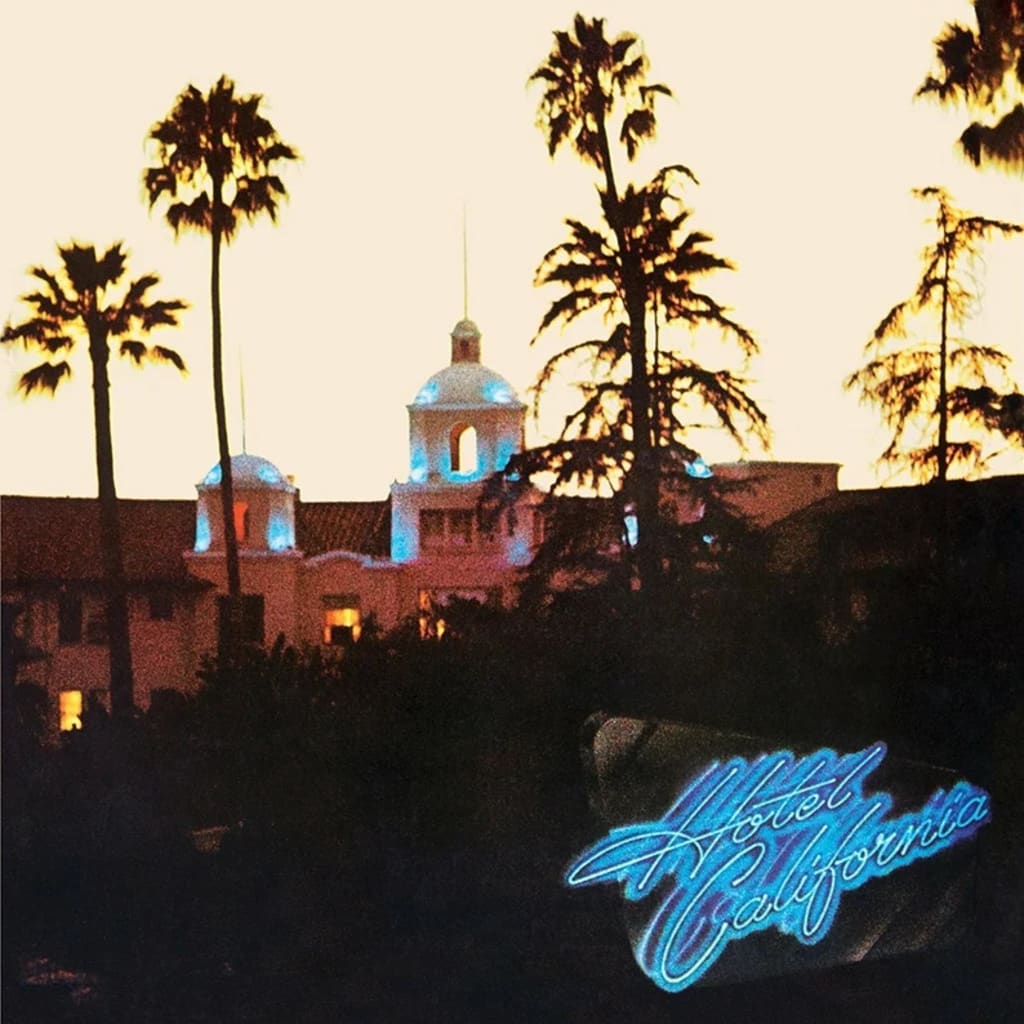'Hotel California'
The Eagles' magnum opus

Following the success of One of These Nights and the subsequent monstrous success of their Greatest Hits album, Eagles were flying high. But both Glen Frey and Don Henley knew the next album would have to be something special, the non-compilation that would stamp the Eagles as THE band of the 70's.
However, the departure of Bernie Leadon at the conclusion of the One Of These Nights tour meant that a new direction would be needed, and the head Eagles knew just what they wanted: a guitar hero. The Eagles decided to invite fellow Irving Azoff client Joe Walsh, formerly of the James Gang and Barnstorm and someone with Top 40 experience with the song "Rocky Mountain Way."
Frey and Henley had known Walsh for some time, in fact they both contributed significantly to his 1974 solo album So What!, which was produced by Eagles producer Bill Sczymczyk. So they were thrilled when Walsh accepted their offer to join the band. The band and Sczymczyk split time between the Record Plant in Los Angeles and Criteria Studios in Miami over eight months in 1976, attempting to perfect the album they both thought could bring the Eagles into another stratosphere.
The origins of what would become the leadoff title track, and the band's second number one single from the album, were brought to the band by Don Felder in the form of the initial chord progression he struck upon while playing a 12-string guitar while relaxing at a rented house in Malibu Beach. Felder recorded it as a demo with a drum machine, which he titled "Mexican Reggae."
This track inspired Henley to write lyrics describing the dark underbelly of Los Angeles and the American dream. In Henley's words: "Because there is a fine line between the American dream and the American nightmare." The song lyrics have been construed in many different ways, from being about a mental hospital to the church of Satan. Henley has denied all such outlandish interpretations saying the song is about "a journey from innocence to experience." The lyrics made the song a defining tour de force for the band, with Felder joining with Walsh to create the unforgettable guitar duel at the end of the song. The interplay between Felder and Walsh became one of the signature guitar passages in the history of rock music.
Up next is "New Kid In Town," a song begun by old friend J.D. Souther, who had written the chorus, and finished by Frey and Henley. Sung by Frey, it could be construed about the fleeting nature of fame and success; but Henley's contributions are about losing a love to Elton John lyricist Bernie Taupin; the woman in question had formerly dated Bernie then Don and was now back with Bernie. So the "New Kid In Town" was actually the old kid in town, in a sense. The song was released as a single the day before the album came out on December 7, 1976, and went on to top the US charts.
"Life In The Fast Lane" originated with a guitar riff from Joe Walsh that was his first substantial writing contribution to the band. The title came from a drug dealer Frey knew who was speeding on the freeway one night and said to passenger Frey "life in the fast lane." Frey knew instantly he had the title for a song, and fashioned a lyric with Henley that fit both riff and tield. The third song on the album, it also was the third single. In a way though unlike the first two, it fell slightly short of the Top 10; but it has become a standard part of the Eagles setlist to this day and is regularly acknowledged as one of the band's 10 best songs.
The first indication that this is not a compilation disc, "Wasted Time" is nevertheless a fine Frey-Henley composition. A melancholic piano and organ driven song that features a full string section arranged and conducted by Jim Ed Norman, the song features a wistful performance by Henley on vocals. The song heightens in emotion as it moves forward, culminating in the realization that the love affair in question in fact was not really "Wasted Time."
Side Two opens with an instrumental string reprise of "Wasted Time," also arranged and conducted by Jim Ed Norman. An unusual touch but also effective--though with the dawn of the CD making the concept of a second side obsolete, it become more and more of an oddity.
A drum beat and guitar lick brings us into "Victim Of Love," another song that originated with Don Felder, which in this case was finished by Henley, Frey and Souther. Felder originally wanted to sing lead on the song and did several takes of it, all of which Henley and Frey did not feel were up to band standards. Manager, Irving Azoff was recruited to take Felder to dinner while Henley recorded the final vocals, which were typically effective but did not change the fact that this was likely the album's weakest, or at least most perfunctory, track.
"Pretty Maids All In A Row" was written by Joe Walsh and his longtime drummer/keyboardist Joe Vitale. Ironically, Joe having been brought to the band for his rock and roll chops, this contribution is a very romantic song , piano-driven with drum fills and angelic harmony vocals. Walsh brought the song to the band with him; his solo albums had always featured one or two songs of this tempo, but this well might have been his finest moment as a balladeer .
Randy Meisner's sole writing and lead vocal contribution is the song "Try And Love Again." It was also his last contribution to an Eagles album, as he would depart the band following the "Hotel California" tour. An underrated song with fine harmony vocals, it was a very good performance to sign off with.
"The Last Resort" is the epic conclusion to the album, credited to Frey and Henley, but with lyrics more telling of Henley: a curmudgeonly indictment of "manifest destiny" and the "white man's burden" and how the American land had been filled with "a bunch of ugly boxes" that people bought as homes. While there is an element of self-righteousness about the song, it encapsulates what Henley meant when he said "There is a fine line between the American Dream and the American nightmare." The song ends with a crescendo of strings, arranged again by Jim Ed Norman.
Hotel California was a resounding success. certified platinum only a week after it was released, becoming their second best selling album after only Their Greatest Hits 1971-1975 . It was nominated for a Grammy for album of the year but lost to Fleetwood Mac's Rumors. Sadly it was the last Eagles album for Randy Meisner who departed the band in 1978. With the success of the album, the Eagles were on top of the world. The only question was How could they top it?
About the Creator
Sean Callaghan
Neurodivergent, Writer, Drummer, Singer, Percussionist, Star Wars and Disney Devotee.






Comments
There are no comments for this story
Be the first to respond and start the conversation.